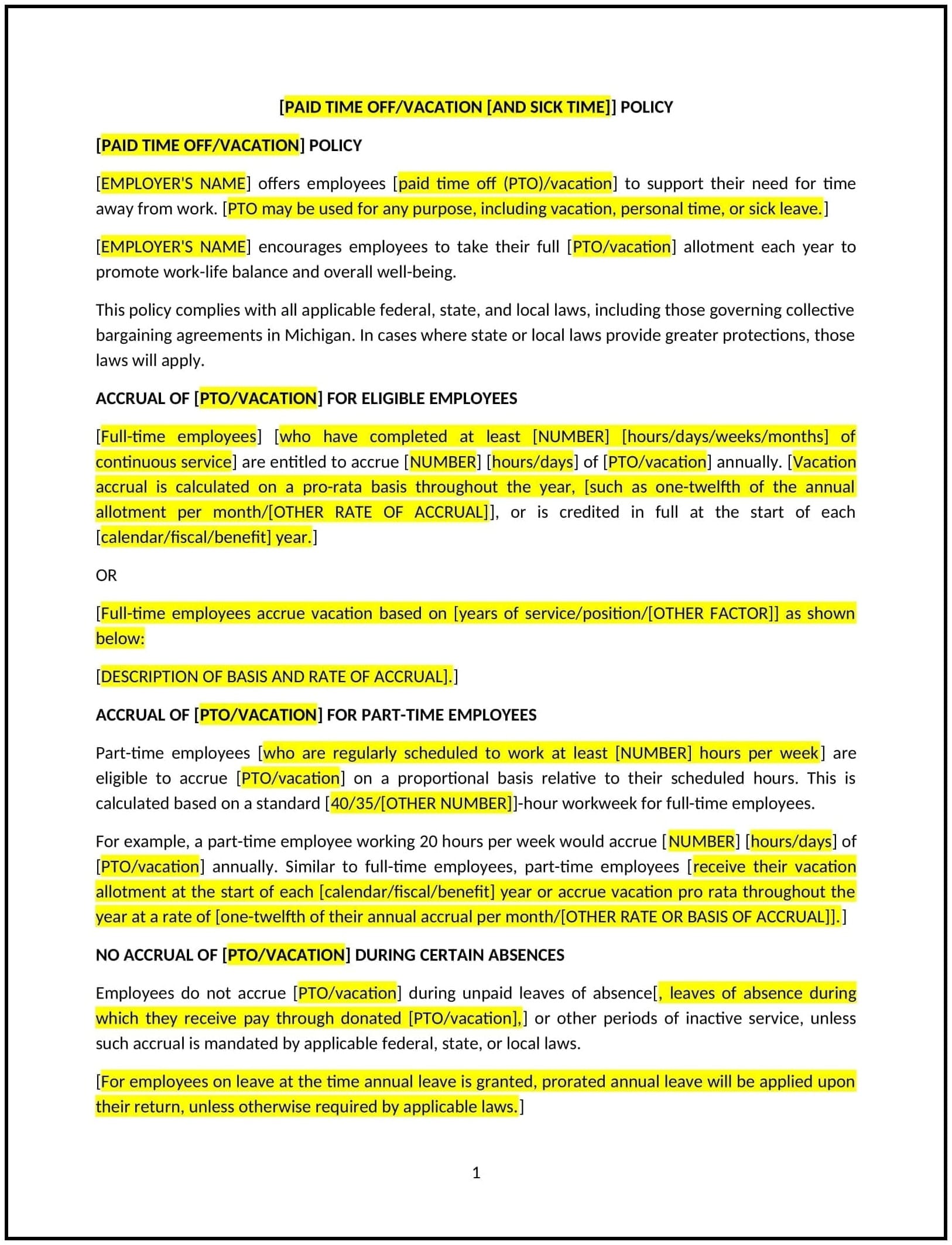Got contracts to review? While you're here for policies, let Cobrief make contract review effortless—start your free review now.

Customize this template for free
Vacation policy (Michigan)
A vacation policy outlines the guidelines for employees in Michigan regarding their entitlement to paid time off for personal vacations. This policy includes details on accrual rates, the process for requesting time off, the approval procedure, and any limitations on the number of vacation days employees can take each year. It helps businesses manage employee vacation time while ensuring fairness and consistency in the allocation and use of vacation days.
By implementing this policy, businesses can promote work-life balance, reduce burnout, and ensure that employees are well-rested and able to take necessary time off without disrupting business operations.
How to use this vacation policy (Michigan)
- Define vacation accrual: Specify how vacation days are accrued, such as based on length of employment, hours worked, or a fixed number of days each year. The policy should clarify the accrual process and how unused vacation days are managed (e.g., carryover, rollover, or loss at year-end).
- Set eligibility requirements: Outline the criteria for employees to be eligible for vacation time, such as full-time employment status, minimum length of service, or probationary period completion.
- Establish the process for requesting time off: Define how employees should request vacation time, including how much notice is required, whether vacation requests need to be submitted through specific channels or software, and any necessary documentation.
- Define approval and scheduling procedures: Specify who is responsible for approving vacation requests and how employees should coordinate time off to avoid scheduling conflicts. The policy should ensure that vacation time does not disrupt business operations.
- Set maximum and minimum vacation days: Set clear limits on how many vacation days employees can take in a given year or per quarter. The policy should also clarify whether there are minimum requirements for using vacation time.
- Address unused vacation days: Clearly define whether unused vacation days can be carried over into the next year or whether they will be forfeited. The policy should specify any carryover limits or expiration dates for unused vacation time.
- Provide for vacation payouts: Specify whether unused vacation days will be paid out upon termination of employment or if they are lost. If vacation payouts are included, the policy should outline how they are calculated.
- Ensure compliance with Michigan state laws: The policy should comply with Michigan state labor laws, including any requirements related to vacation accrual, usage, and payment for unused days.
- Review and update regularly: Periodically review and update the policy to ensure it reflects changing business needs, legal requirements, and employee preferences.
Benefits of using this vacation policy (Michigan)
This policy provides several key benefits for Michigan businesses:
- Promotes work-life balance: Offering vacation time helps employees recharge, which can lead to improved job satisfaction, higher productivity, and reduced stress.
- Enhances employee retention: By providing a fair and consistent vacation policy, businesses can increase employee satisfaction and loyalty, reducing turnover.
- Ensures fairness: A standardized vacation policy ensures that all employees have equal access to vacation time, which helps maintain fairness and consistency in the workplace.
- Improves operational efficiency: The policy helps businesses manage vacation requests and avoid disruptions in operations by setting clear guidelines for scheduling and approval.
- Reduces legal risks: A well-defined vacation policy helps ensure compliance with Michigan state laws and minimizes legal risks related to vacation accrual, usage, and payouts.
- Supports employee well-being: Vacation time contributes to better mental health and physical well-being, helping employees remain productive and engaged in their roles.
Tips for using this vacation policy (Michigan)
- Communicate the policy clearly: Ensure all employees are aware of the vacation policy by including it in the employee handbook, during onboarding, and in regular reminders about time-off policies.
- Manage vacation requests efficiently: Set up a clear process for submitting and approving vacation requests, ensuring that there is enough time for managers to plan for coverage.
- Encourage employees to use vacation time: Promote the importance of taking vacation time to prevent burnout. Encourage employees to use their time off throughout the year instead of saving it all for the end of the year.
- Track vacation balances: Use tracking systems to monitor employees’ vacation balances and ensure that they are aware of their accruals and limits.
- Plan for staffing coverage: Plan ahead for employee vacations by cross-training staff or adjusting schedules as needed to minimize disruption during peak vacation periods.
- Review the policy regularly: Periodically assess the policy to ensure it remains relevant and aligned with business needs, employee preferences, and Michigan state laws.